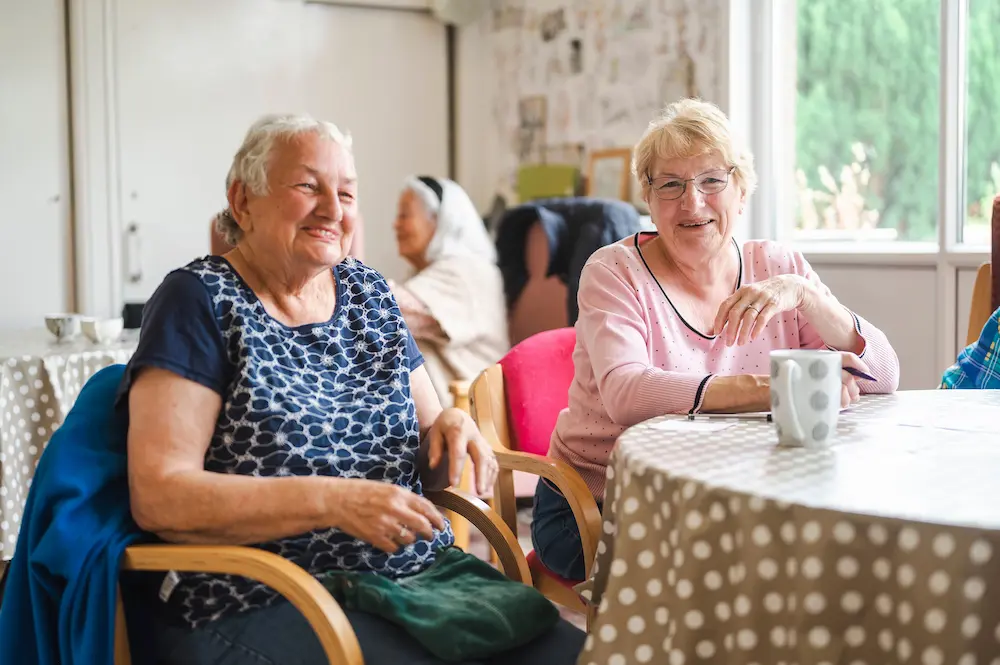What are the 6 C’s of Care and Why Do They Matter?

Estimated Reading Time: 7 minutes
The 6 C’s were developed to ensure an excellent level of care is provided across different care settings such as care homes and hospitals, while also being part of the ‘Compassion in Practice’ strategy used by the NHS. People working in a role that involves caring for others should follow best practices while striving to provide compassionate support that treats everyone with dignity and respect.
Keep reading to learn more about the 6 C’s in care and nursing, why they’re important and the care settings they can be applied to.
Arrange care at home
Browse the best home care in your area.
In this article:
- What are the 6 c’s of care?
- Why are the 6 c’s of care important and why were they introduced?
- What care settings do they apply to?
What are the 6 C’s of Care?
The 6 C's are core values that form guiding principles for health and social care professionals in the UK.
Care, compassion, competence, communication, courage, and commitment are the 6 C’s established by the NHS and play a vital role in providing compassionate care that is of an excellent standard and delivered by registered healthcare professionals, clinical support staff, non-clinical staff and nurses within nursing homes.
1. Care
Care should be at the core of how every care provider operates. Providing a high level of care will help people on an individual basis - as well as improving the local community and care industry. People who receive care will expect it to be right for them, at every stage of life.
Prevention, early intervention and health promotion are just as important as the treatment of ill health. Care should ensure that people can enjoy a positive experience while receiving the best possible outcomes.
For this to happen, care seekers need to be supported and provided with the necessary services that’ll allow them to remain active, connected and independent - whether this is in their own home, a care home or somewhere else.
As life expectancy increases, the demand for long-term care and support for older adults continues to grow. The 6 C’s have led care providers to think about health and care in new ways so they can deliver integrated services to people, families and communities.

2. Compassion
Compassion is about care being given through relationships based on empathy, respect and dignity.
The quality of care that residents receive is just as important as the quality of treatment. When receiving care, people want to be treated kindly, with dignity and respect. They should feel as though their carer has a genuine interest in them and their story. This means understanding individual needs and providing person-centred care.
In terms of the 6 C’s, demonstrating compassion also involves people being included in the decision-making process where their own care is concerned. People want their feedback and views to be listened to and acted upon.
3. Competence
Being competent in care means being able to understand an individual’s health and social requirements, along with the expertise and clinical knowledge needed to deliver amazing care.
This goes all the way back to recruitment. The 6 C’s can be used as a tool for recruiting into roles across all levels within the care sector. They can be used to assess the personal values of people applying to a specific role.
The 6 C’s are also mentioned across lots of care qualifications to empower staff to improve the experience for people using their services.
4. Communication
Communication involves several skills that caregivers will need to use when providing high-quality care, including customer service, properly dealing with complaints and working in a team.
Care staff on the frontline are at the heart of this communication process. These care workers will assess, report and record the support provided in their care. They need to make sure that information is handled sensitively and confidentially. They also need to actively listen to what they’re told by the people they care for, along with co-workers, managers and other agencies.

5. Courage
Carers and members of staff having courage will allow them to do the right things for the people they care for while speaking up whenever concerns arise and being able to embrace new ways of working within the care industry.
Lots of responsibility comes with working in the care sector, so care workers naturally take on lots of responsibility themselves including:
- Being accountable for the care they provide
- The safety of their residents
- Having to make judgement calls that’ll affect others
A judgement call staff may have to make is being courageous enough to report something that they believe could be done more effectively.
The 6 C’s of care were created to empower care staff to contribute to improvements across the industry, with one of the main ways they can do this being by ‘whistle-blowing’ when something is wrong. Though care workers may find this uncomfortable, they need to be honest and brave for change to happen.
6. Commitment
The commitment part of the 6 C’s doesn’t just refer to the dedication of carers within their role. It also refers to a willingness for staff to keep developing their skills and knowledge. Carers can share knowledge with others while challenging any malpractice or discriminatory behaviour to improve the quality of care provided within the industry as a whole.
It’s also a commitment to fully embrace the 6 C’s and think about them daily.
Why are the 6 C’s of Care Important and Why Were They Introduced?
The main purpose of the 6 C’s is to make sure anyone within a care setting is looked after and supported with compassion, by people who are empathetic and communicate well. The 6 C’s encourage people to provide an amazing and ever-improving level of care.
This set of values was created by NHS England Chief Nursing Officer Jane Cummings and was launched in December 2012.
Individually, each of the C’s highlights an aspect of care and support, while together they’re able to define a consistent vision and set of common values that can be applied across the entire care sector.
They give us an easy-to-understand way of explaining the principles that care staff believe to be most important, while also providing a way of holding services to account (if they aren’t up to scratch).
The 6 C’s are all equally important in ensuring compassionate care is given.

Applying the 6 C's in Practice: What Care Settings Do They Apply To?
The number of people working in the UK adult social care sector for 2021-21 was estimated at 1.54 million. Around 1.2 million of these are in full-time equivalent jobs (similar to the NHS), including 865,000 care workers, 87,000 senior care workers and 36,000 registered nurses. There are also 135,000 roles directly employed by individual users of care services.
The Compassion in Practice strategy and the 6 C’s apply to all care and support settings in the UK, including:
- Ambulances
- Care homes (such as residential care homes, nursing homes and dementia care homes)
- Clinics
- Community services
- Dental surgeries (some over 60s in the UK get free dental treatment)
- Doctors and GP surgeries
- Home care and other home services
- Hospices and through hospice care
- Phone and online advice
- Prison healthcare
The 6 C’s also apply to the workers and volunteers within these care settings, including:
- Attendant care workers
- Carers
- Community support workers
- Dentists
- Doctors and GPs
- Disability support workers
- Home care workers
- Hygienists
- Nurses
- Occupational therapists
- Paramedics
- Personal care workers and assistants
- Volunteer carers




